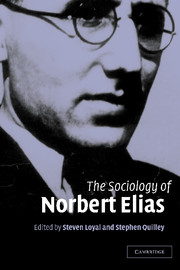Book contents
- Frontmatter
- Contents
- List of contributors
- Acknowledgements
- 1 Towards a ‘central theory’: the scope and relevance of the sociology of Norbert Elias
- Part I Sociology as a human science: Norbert Elias and the sociology of knowledge
- 2 From distance to detachment: knowledge and self-knowledge in Elias's theory of involvement and detachment
- 3 Ecology, ‘human nature’ and civilizing processes: biology and sociology in the work of Norbert Elias
- 4 Between the real and the reified: Elias on time
- Part II Processes of stratification: figurations of race, class and gender
- Part III The formation of individuals and states
- Part IV Religion and civilizing processes: Weber and Elias compared
- Index
- References
4 - Between the real and the reified: Elias on time
Published online by Cambridge University Press: 22 September 2009
- Frontmatter
- Contents
- List of contributors
- Acknowledgements
- 1 Towards a ‘central theory’: the scope and relevance of the sociology of Norbert Elias
- Part I Sociology as a human science: Norbert Elias and the sociology of knowledge
- 2 From distance to detachment: knowledge and self-knowledge in Elias's theory of involvement and detachment
- 3 Ecology, ‘human nature’ and civilizing processes: biology and sociology in the work of Norbert Elias
- 4 Between the real and the reified: Elias on time
- Part II Processes of stratification: figurations of race, class and gender
- Part III The formation of individuals and states
- Part IV Religion and civilizing processes: Weber and Elias compared
- Index
- References
Summary
Introduction
A burgeoning interest in knowledge has been one of the most striking and significant developments in the social sciences over the last quarter of a century. Nor has this shift in attention resulted merely in the relocation of the debates and controversies characteristic of these fields. Something close to an agreed conception of knowledge has emerged, even if how precisely knowledge should be analysed and understood remains hotly disputed. Knowledge is now routinely perceived as something akin both to language and to practical skills, in being a part of the cultural tradition of society, something passed on down the generations as the shared possession of its members. And, indeed, this conception can seem so obviously correct to social scientists today that it is important to remember that the grip of individualistic, ahistorical conceptions of knowledge was until quite recently a strong one, and that for some at least the transition to the current perspective was not altogether easy. Only as we saw how to treat the natural sciences, including mathematics, as parts of our inherited culture, and began to grasp the full implications of the claim that ‘scientific knowledge, like language, is intrinsically the common property of a group or else nothing at all’ (Kuhn 1970: 210), did the transition at last occur. Only then was the current conception acknowledged as applicable to all knowledge, and hence to knowledge qua knowledge as it were, rather than qua mere belief.
- Type
- Chapter
- Information
- The Sociology of Norbert Elias , pp. 59 - 72Publisher: Cambridge University PressPrint publication year: 2004
References
- 3
- Cited by



